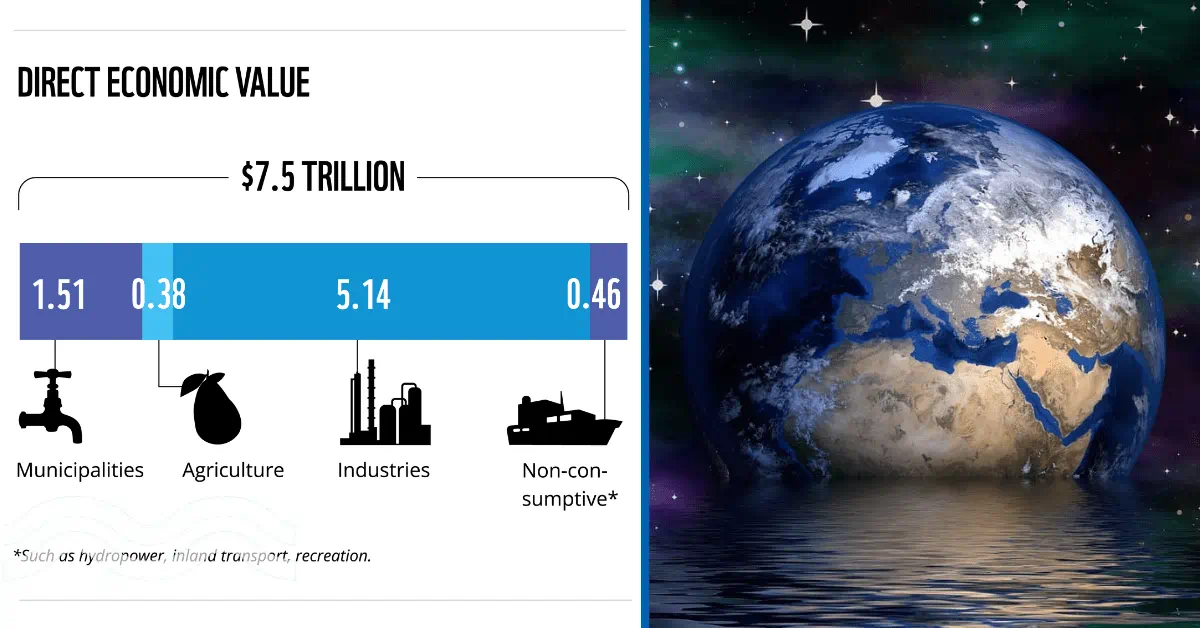Water, often underappreciated and perceived solely as a tangible commodity measured in litres and gallons, has long been underappreciated for its broader significance in sustaining life on earth. However, a new report released by the WWF has shed light on the hidden economic and ecological value of water.
The high cost of cheap water
The report aptly titled ‘The High Cost of Cheap Water’, paints a stark picture of the critical role freshwater ecosystems play in supporting human societies, economies and the planet's delicate balance.
In a world grappling with the impending water crisis, the report's findings serve as a wake-up call, revealing that the annual economic value of water and freshwater ecosystems stands at a staggering $58 trillion, equivalent to a substantial 60 per cent of the global Gross Domestic Product (GDP).
Delving into the intricate web of the world's freshwater crisis, the report showcases the interconnectedness of water resources with human well-being, biodiversity, and economic prosperity. In an era marked by escalating climate disruption and widespread nature loss, the critical need for urgent and comprehensive action to safeguard the irreplaceable value of water is particularly highlighted.
Water’s significance and direct use
An important revelation from the report is the notion that water's significance extends far beyond its direct use. While the quantifiable direct economic benefits of water usage, including consumption for households, agricultural irrigation and industrial purposes, amount to $7.5 trillion annually, the unseen and often overlooked benefits are sevenfold higher, estimated to be approximately $50 trillion.
These indirect benefits, such as water purification, carbon storage, and protection against extreme floods and droughts, show the indispensable role of healthy freshwater ecosystems in sustaining not only economies but also biodiversity hotspots and the well-being of communities worldwide.
The report also highlights the degradation of rivers, lakes, wetlands, and groundwater aquifers, citing the need for transformative measures to reverse the ongoing loss of these critical ecosystems. With one-third of the world's wetlands lost since 1970 and two-thirds of the largest rivers no longer free-flowing, the urgency to address the crisis has never been more apparent, the report says.
Consequences of this degradation are already manifesting in the form of water shortages, food insecurity and the growing risk to businesses and economies, with projections indicating that nearly half of the global GDP could originate from regions facing high-water risk by 2050.
“Water and freshwater ecosystems are not only fundamental to our economies, they are also the lifeblood of our planet and our future,” says Stuart Orr, global freshwater lead at WWF.
“We need to remember that water doesn’t come from a tap – it comes from nature. Water for all depends on healthy freshwater ecosystems, which are also the foundation of food security, biodiversity hotspots and the best buffer and insurance against intensifying climate impacts. Reversing the loss of freshwater ecosystems will pave the way to a more resilient, nature-positive and sustainable future for all.”
Droughts in the US and Mexico
Citing the US and Mexico, the report says the Rio Grande/Rio Bravo (RGRB) is drying up due to extensive human water withdrawals that are exacerbated by climate change. The RGRB supplies water for agricultural, industrial and municipal uses for more than six million people in the United States and slightly over 10 million people in Mexico.
The report says that if actions are not taken, we could see a 25 per cent loss of river flows in parts of the RGRB basin by 2050, leading to devastating consequences for the people, wildlife and businesses that it sustains.
“The alarming impacts from droughts, floods, decline of critical species, and water availability for human use and agriculture are staggering,” adds Michele Thieme, deputy director of freshwater at the WWF.
Paradigm shifts in water management
While the report lays bare the grim realities of the global water crisis, it also advocates for a paradigm shift in water management approaches, stressing the importance of recognising freshwater ecosystems as natural infrastructure that can effectively mitigate the challenges posed by climate change and nature loss.
Governments, businesses, and financial institutions are urged to invest in sustainable water infrastructure and commit to restoring degraded rivers and wetlands to ensure the resilience of water resources for future generations.
In the face of the escalating water crisis, the report emphasizes the indispensable value of water as the cornerstone of sustainable development and the key to building a more resilient and nature-positive future.
As societies grapple with the interplay between water scarcity, environmental degradation and economic prosperity, the need to prioritise the preservation and restoration of freshwater ecosystems has never been more critical.
Indeed, the report heralds a new era of understanding the true worth of water.






